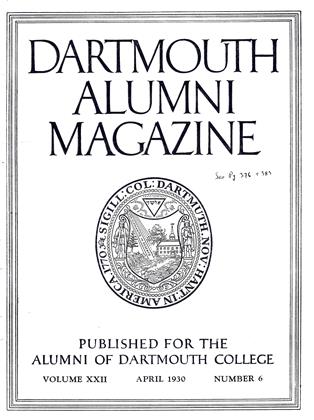Dartmouth has been very successful in bringing her alumni into the whole academic program. Close touch is maintained by local alumni clubs. The alumni publication has a distinct educational objective and in addition reading lists have been distributed. "Adult Education and the Library."—American Library Association.
By PROFESSOR A. S. EDDINGTON. Maximilian, 1929.
In this book Professor Eddington reveals himself, not only as a scientist of broad and penetrating understanding, but as a scholar who has read the great philosophers and has learned the lessons which these philosophers particularly Kant, have to teach.
This little book contains his Swarthmore lectures and its main message is that there is nothing in Science which can destroy religion. Science studies that physical world which in man is somehow the substratum of a mind for which notions of right and wrong, which for science have no meaning, have a fundamental significance. "We say that the brain that produces '7 times 9 are 63 is better than the brain that produces '7 times 9 are 65'; but it is not as a servant of natural law that it is better. Our approval of the first brain has no connection with natural law; it is determined by the type of thought which it produces, and that involves recognizing a domain of the other type of law—laws which ought to be kept but may be broken. Dismiss the idea that natural law may swallow up religion; it can not even attack the multiplication table single-handed." Pp. 57, 58.
Perhaps the most important passage in the book is that on pp. 74-78, where Professor Eddington points out that there ought and may be developments of theological study which are as normative for man's religious aspirations as the developments of his knowledge of the nature of the physical world. HE is entirely opposed to the basing of religion and theology on science, and holds that present tendencies in that direction are based on entirely erroneous conceptions of the nature and validity of science.
Department of Philosophy.
 View Full Issue
View Full Issue
More From This Issue
-
 Lettter from the Editor
Lettter from the EditorEditorial Comment
April 1930 -
 Sports
SportsFootball at Dartmouth Since the War
April 1930 By Professor James P. Richardson -
 Article
ArticleThe Rough-and-Ready Eighties
April 1930 By William A. Bartlett '82 -
 Class Notes
Class NotesCLASS OF 1908
April 1930 By A. B. Rotch -
 Article
ArticleIntercollegiate Keys to Hospitality
April 1930 By Craig Thorn, Jr. -
 Class Notes
Class NotesCLASS OF 1901
April 1930 By Everett M. Stevens
Books
-
 Books
BooksPOLLUTION, PROFITS & PROGRESS.
JANUARY 1972 By CHARLES KERSHNER -
 Books
BooksTHE HEALING OF A NATION.
OCTOBER 1971 By CHARLES M. WILTSE -
 Books
BooksTHE DEFENSE OF BERLIN.
JULY 1964 By HENRY W. EHRMANN -
 Books
BooksTHE BLACK LILY
July 1951 By Herbert F. West '22 -
 Books
BooksSYMBOLS OF AMERICA
January 1947 By T. S. K. Scott-Craig -
 Books
BooksTHE MONETARY AND BANKING SYSTEM
October 1950 By William A. Carter '20

